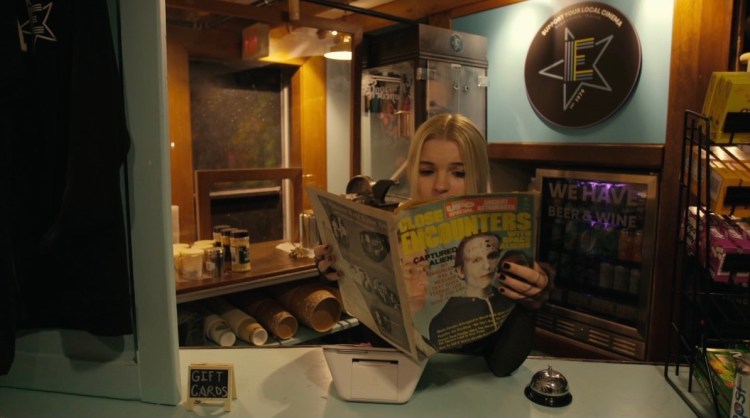First up, a confession/humblebrag.
When I was recently asked to be a judge for the Maine Film Association’s first ever 72-hour Winter Film Challenge, all of the judges singled out a young actress named Claire Statczar. Appearing in Whisky Wolf Media’s mockumentary entry “Cinema Absentia,” Statczar played the disaffected sole teenage employee of a uniquely targeted experimental movie theater. She used her time staffing the concession counter to complain, read gossip mags and occasionally sweep floor popcorn right back into the unsuspecting bucket of the theater’s single, oblivious customer.
Statczar came up repeatedly in the judging deliberations, the young actor’s comic timing and (as we suspected) improvisational chops gaining effusive praise from everyone. So it was an unexpected delight when I received an email from Claire Statczar the very next week, asking if, perhaps, I’d be interested in telling the story of her Maine-to-away and back again filmmaking endeavors.
I was, and if I had to apologize that “Cinema Absentia” didn’t win the Winter Film Challenge (it was definitely in the mix), the grateful and upbeat Statczar was very nice about it. The film, written and directed by Maine filmmaker David Jester, was certainly a top contender among the impressive crop of made-in-three-days Maine shorts, with Statczar revealing that the team is preparing to expand the project, on a more relaxed timetable.
For Statczar, Maine is birthplace and current home. The Portland-born actress’ family moved when she was 2, only to return in 2020 after stops in Santa Fe and various places in the Midwest, including Chicago. That’s where Statczar studied at the legendary improv hub Second City, thus preparing her to improvise so adeptly in “Cinema Absentia.”
“Even though we moved when I was 2, we always came back,” Statczar said. “My mom’s family was here, and I celebrated every birthday in Maine.”

Claire Statczar returned to Maine to find more film work than she expected. Photo by Rebel Darling Studios
Coming back to Maine wasn’t necessarily the plan for the young aspiring actress, though. After choosing to homeschool herself to better pursue of her acting career, she was initially skeptical that her family’s return was an ideal situation. “I thought there’s no way I was going to be able to pursue a career in Maine,” confessed Statczar, who recently signed with the Maine-based Dirigo Talent Agency, “But now I think it’s absolutely possible to make something of myself in Maine.”
The enthusiastic and motivated Statczar has, indeed, hit the ground running since moving to Maine in September 2020. In addition to “Cinema Absentia,” she is currently in a short horror film that will appear as part of this year’s Maine Mayhem Southern Maine Community College student film festival and, among various other projects, has solidified her relationship with Whisky Wolf Media by taking on various behind-the-scenes roles in David Jester and Leigh Doran’s upcoming Stephen King adaptation, “One for the Road.” In addition, Statczar has been reaching out to others in the Maine film community, people who she says are as optimistic about Maine’s filmmaking future as she is.
“The amount of talent Maine has is amazing,” said Statczar. “Apart from the number of talented people I’ve met here, the number of filmmakers picking up and relocating to Maine really gives me a lot of hope for the film industry here.” As befitting someone so young and ambitious, Statczar is especially forward-thinking about Maine’s film future, singling out one essential element that needs to be addressed for Maine to truly become fertile ground for film production.
“Tax incentives are key, is what I’ve learned,” said Statczar of her research into LD1334, a proposed bill under discussion in the Maine Legislature. Wordily but informatively subtitled, “An Act to Promote Economic Development Through Increased Film Incentives,” that’s the bill that would put Maine – with all our undeniably cinematic and varied potential filming locations – on competitive footing with such film-friendly destinations as Atlanta, Boston and all those places that inelegantly sub in for Maine in pretty much every Stephen King adaptation that hits the screen.
“It’s key to strengthening the industry up here,” opined Statczar. “Since coming here, I’ve met so many filmmakers who would really love to work in Maine, but who are going out of state because of the costs.” Adding that film companies, with their attendant needs for Maine businesses of all kinds, would have a positive economic impact on the state, Statczar stumps equally hard for the idea that a higher film profile would only benefit those actors and filmmakers who’d prefer to remain here.
“Exposure’s really important,” Statczar said. “There are people in the state who don’t even know about how much the Maine film industry is expanding.” And while readers of this column know my thoughts on the subject (“Tax breaks for film production have literally no down side, people!” I croak, crankily), it’s young and creative Maine film professionals like Claire Statczar who have the most invested in making sure Maine’s film industry continues to grow.
“I’m really thankful for the opportunities I’ve been given in Maine,” Statczar said, “and also for the fact that so many people in the state right now are so deeply focused on expanding the film industry here. It’s a great time to be in film in Maine, and I’m excited to see where it goes.”
Dennis Perkins is a freelance writer who lives in Auburn with his wife and cat.
Send questions/comments to the editors.



Comments are no longer available on this story